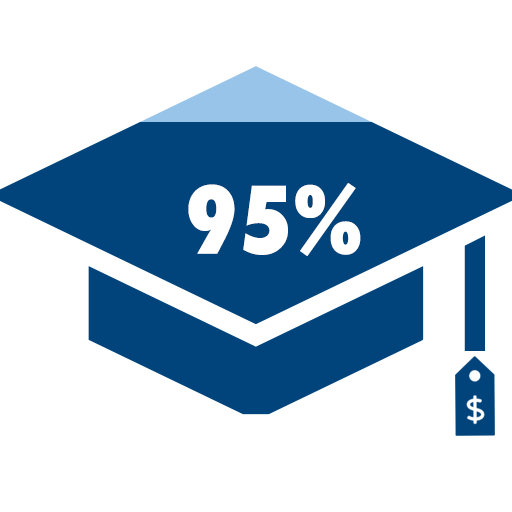What is a PhD in Biostatistics?
The PhD in Biostatistics is a full-time degree program offered at Drexel University Dornsife School of Public Health. This doctoral program trains students to become highly functional statistical researchers with the breadth of knowledge to contribute to many applied domains or to specialize in a single theoretical domain.
The Biostatistics PhD program is designed to provide students with a quantitative foundational core in statistical theory while simultaneously offering opportunities to apply these concepts to a wide range of practical applications.
Graduates of the PhD in Biostatistics program are well suited to use their training to enrich and contribute in the field of biostatistics.
Some of the research interests of Dornsife's current PhD in Biostatistics students are disease mapping, machine learning methods, clinical trials, health disparities, and statistical genetics.
Why Pursue a PhD in Biostatistics at Drexel Dornsife?
Students enrolled in the PhD in Biostatistics program at Drexel Dornsife are offered interdisciplinary instruction and various research opportunities. These offerings are designed to provide a solid training in both statistical theory and in applications of biostatistical methods to a variety of relevant contexts that are central to modern interdisciplinary research.
Unique benefits of the PhD in Biostatistics program at Drexel Dornsife include:
- Full-time students with research or teaching fellowships receive full tuition, 12-month stipend, and health insurance.
- Small cohorts ensure access to faculty, small class sizes and a strong sense of community and student organizations.
- Students receive foundational training in both theory and applications, including exposure to contemporary quantitative concepts in data science.
- Students may gain teaching experience and work among award-winning faculty.
- Students will have an opportunity to choose a cognate area of focus including epidemiology, environmental health, urban health, health policy and management or health informatics.
- Students attend the #1 graduate school of public health in Philadelphia, accredited by the Council on Education for Public Health (CEPH).
All applicants are automatically reviewed for a graduate assistantship, which includes full tuition remission, a health insurance subsidy and a stipend in exchange for 20 hours-a-week of teaching and/or research support, based on department needs. Graduate assistantships can be renewed yearly based on student's performance and available funding.
Prospective doctoral students are also eligible for the Urban Health Collaborative Doctoral Fellowship Program. Fellows will be supported to conduct urban health research under the mentorship of a faculty research sponsor. Fellows will receive a stipend, full tuition remission and additional support for research and travel. Awards are renewable for a second year.
PhD in Biostatistics Competencies & Learning Objectives
The biostatistics graduate program prepares students to:
- Master fundamental concepts in probability and statistical theory
- Construct an analysis plan to evaluate a scientific question of interest
- Critically appraise statistical methods literature
- Communicate statistical findings effectively and succinctly using data visualization tools and appropriate summaries
- Direct quantitative methods of collaborative investigations with researchers in public health, medicine, and other health science disciplines
To learn more about the PhD in Biostatistics program, request more information to speak with an academic advisor today.
Request More Information
PhD in Biostatistics Admissions Requirements
Who Should Apply for a PhD in Biostatistics?
The Dornsife School of Public Health seeks passionate, collaborative students who graduate with the knowledge, skills and perspective necessary to make a difference in the health of communities in the United States and around the world.
Candidates for admission to the biostatistics PhD should be skilled in mathematics and statistics, complemented by hands-on experience in practical applications, professional settings, or research endeavors.
To be considered for the PhD in Biostatistics program at Drexel Dornsife School of Public Health, applicants must meet the following requirements:
- Completion of a Bachelor's or a Master's degree from an accredited institution and must satisfy general Drexel University School of Public Health requirements for admission.
- Strong academic background in mathematics, statistics, and related sciences, in addition to practical, professional, or research experience. Background in mathematics should include one year of calculus including multivariate calculus, linear algebra, and a calculus-based course in probability or statistics. Additional background in biological, social, or health sciences is desirable.
PhD applicants in biostatistics traditionally have an undergraduate degree in mathematics or statistics, but students with degrees in other fields, in particular data science, computer science or engineering, will be considered with the requirement that necessary mathematical course work must be completed. Applicants must have at least a B+ average in courses required as prerequisites for the program.
Acceptance to the PhD in Biostatistics program for the AY2026-2027 is contingent upon funding lines that are currently pending. We encourage part-time and self-pay applicants.
Application Requirements for the Biostatistics PhD Program
In order for your doctoral application to be reviewed, applicants must complete the following:
- Online application
- Official transcripts from every college-level institution you attended (academic records from institutions outside the U.S. must undergo a credentials evaluation).
- English proficiency test score (TOEFL or IELTS), if applicable
- Three letters of recommendation
- Resume or curriculum vitae
- Statement of Purpose and Objectives
A note on official GRE scores: GRE scores are not required for admissions decisions and are not reviewed if submitted. The Admissions Committee evaluates candidates based on a holistic and overall assessment of the required application materials.
To learn more about application and admissions requirements for the PhD in Biostatistics program, please visit the page below.
Admissions and Application Requirements
Biostatistics PhD Program Curriculum
The PhD in Biostatistics curriculum is rooted in hands-on research and statistical analysis that encourages students to uncover key scientific discoveries that positively contribute to the public health industry.
Faculty research areas, with applications to cardiovascular health, behavioral modification interventions, health disparities and urban health, include Bayesian statistics, clinical trials (including adaptive designs), spatial statistics, environmental statistics, and data confidentiality.
Students develop a course of study that builds their skills and knowledge in core concepts including:
- Statistical Theory
- Quantitative Concepts in Data Science
- Biostatistics Methodology
- Modern Interdisciplinary Research
Required Courses to Complete a Biostatistics PhD
The Biostatistics PhD program consists of required core courses and electives in the Dornsife School of Public Health, and in other academic units across Drexel University.
Some of the core courses in the program include:
- BST 869 Linear Statistical Models - 4 credits
- BST 870 Generalized Linear Models - 4 credits
- BST 804 Applied Bayesian Analysis - 3 credits
- BST 823 Theory of Generalized Linear and Mixed Models - 3 credits
- BST 825 Probability Models and Stochastic Processes - 3 credits
- BST 826 Research Skills in Biostatistics I - 1 credit
- BST 701 Advanced Statistical Computing - 3 credits
Students entering with a master's are waived from certain core classes.
Students select electives that align with their research interests and professional goals, and learn and practice the research skills necessary for writing and defending a dissertation.
In order to receive a PhD in Biostatistics, students entering post-master's must successfully complete 51 credit hours. Students entering post-bachelor's must successfully complete 90 credit hours.
To learn more about the PhD in Biostatistics curriculum, please follow the links below.
Review Degree Requirements and Required Courses
Sample Plan of Study and Alternative Plan of Study
Browse Recent Dissertation Titles
How Long Does a PhD in Biostatistics Take?
Post-master’s students can complete the program in as little as two years, while post-baccalaureate students can complete the program in as little as three years.
The program includes passing a comprehensive exam, developing and defending a dissertation proposal, completing a dissertation of publishable quality, and a final defense.
What Can You Do With a PhD in Biostatistics?
The PhD in Biostatistics program will prepare doctoral students for successful careers in academia (both teaching and research), government agencies, private health-related organizations/industries and many other data-driven industries.
Applying statistics to the advancement of public health can lead to a promising and fulfilling career. Some biostatistics careers require a master's degree for entry level positions, while some jobs require a doctoral degree.
Some careers for individuals with a PhD in Biostatistics include:
- Data Analyst
- Research Scientist
- Statistical Programmer
- Survey Researcher
- Clinical Researcher
- Biostatistician
- Machine Learning Scientist
A PhD in Biostatistics opens up opportunities in fields such as genetics, medicine, environmental health, bioinformatics, and pharmaceuticals.
PhD in Biostatistics Salary Scale
While salaries for individuals with a PhD in Biostatistics can vary across locations and industries, salaries for statisticians can range from $60,390 to $170,700, with the median annual salary for statisticians being $103,300 as of May 2024. According to the Bureau of Labor Statistics, statisticians' salaries in select public health industries were the following:
| Median salary |
$103,3000 |
| Federal government |
$128,940 |
| Research and development in the physical, engineering, and life sciences |
$122,390 |
| Healthcare and social assistance |
$99,540 |
The Bureau of Labor Statistics writes that employment of statisticians is projected to grow 11 percent from 2023 to 2033, much faster than the average for all occupations.
Enhance your skill set and advance your career with a PhD in Biostatistics from Drexel Dornsife School of Public Health. Start your application today.
Apply today

Biostatistics Doctoral Students
Drexel's biostatistics PhD students are investigating complex public health challenges through hands-on research and collaborative statistical analysis.
Meet current students

Paying for Your Public Health Degree
Ninety-five percent of PhD students receive tuition remission, stipend, and health insurance.
In general, PhD students finance their education through a variety of sources, and the Dornsife School of Public Health provides financial support through training grants, scholarships, stipends, and working as a teaching or research assistant.
Explore scholarships and financial aid